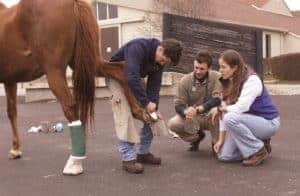Crowd Control
- Topics: Working With Morocco's Horses
Today was the busiest day in the clinic since I arrived. It’s just our luck that Houssine, the large animal technician is on vacation this week, magnifying the craziness. An overwhelming number of mules and donkeys came in because "he’s losing weight and food falls out of his mouth," so I got to spend lots of time sweating it out with a hand float. The majority of the patients, though, were of the small animal type. At one point, I looked over to see a group of about 20 people getting loud and impatient because some were being seen before others. People were walking up to me, trying to hand me their animals, obviously distressed and wanting some attention. Trying to restore some order and prevent a riot, Azami and I frantically began tearing little pieces of paper and scribbling numbers on them. Thankfully the "please take a number" system was successful! Everyone waited much more patiently and we were able to see all of the patients before the doors closed for lunch.
Azami spent a lot of time translating Arabic for me today so that I could communicate directly with the animal owners and help things move along more quickly. I was staring at a gray horse that was showing signs of advanced neurological disease. When I went through the usual "please tell me what the problem is," I couldn’t help but laugh when Azami relayed the message that the mare hadn’t urinated in three days. I couldn’t believe that the owner didn’t seem to mind the fact that the poor animal could hardly stand! I suppose he would have figured it out sooner or later when she just fell over in the street. Forgive my sarcasm, but some of this stuff gets pretty hard to swallow at times. We hospitalized the mare for further observation and treatment. Indeed she has a raging urinary infection in addition to the generalized ataxia and some cranial nerve deficits. Our working diagnosis right now is equine herpesvirus-1 infection.
Unfortunately, we will not be able to confirm such a diagnosis because confirmatory testing such as antibody titers is generally unavailable and not cost effective for the Fondouk. The prognosis is guarded, but we are treating her and monitoring her condition closely.
I talked to Dr. Frappier today about another aspect of the situation that makes diagnosing diseases almost impossible. The owners seldom answer questions truthfully, or they just do not know the medical history because they don’t see the animal every day. A great deal of veterinary medicine depends on acquiring an accurate and detailed history of the problem at hand and any past problems. Since that information is completely unavailable, we are blindfolded in a sense when it comes to prescribing an appropriate treatment. It makes things very difficult, but Doc seems to have learned to accept the fact and do the best he can under these circumstances
Create a free account with TheHorse.com to view this content.
TheHorse.com is home to thousands of free articles about horse health care. In order to access some of our exclusive free content, you must be signed into TheHorse.com.
Start your free account today!
Already have an account?
and continue reading.
Written by:
Jeremy Campfield
Related Articles
Stay on top of the most recent Horse Health news with












